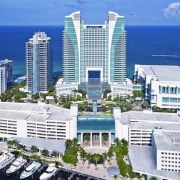Will Rising Interest Rates Also Propel Upward Movement In Commercial Real Estate Cap Rates?
Interest-rate hikes from the Federal Reserve are expected this year. One key question still being debated by the commercial real estate industry: What do rising interest rates mean for capitalization rates?
One of the most commonly used valuation measures in commercial real estate, cap rates are determined by dividing a property’s net operating income by its current market value. Cap rates are often used to compare the rates of return on commercial properties, and also give insight into how much risk a property may carry.
Since the pandemic, cap-rate compression has been observed, especially, in white-hot sectors like industrial and multifamily.
There’s not a one-to-one correlation between cap rates and interest rates, although economists say the expected hikes coming this year could have some influence on where cap rates go in 2022.
Brian Bailey, commercial real estate subject-matter expert at the Federal Reserve Bank of Atlanta, said in a discussion this week hosted by commercial real estate software company Altus Group Ltd. that a rise in cap rates is prompted by many variables. But the prospect of rising interest rates does create risk for higher cap rates.
The risk associated with higher cap rates depends, too, on loan-to-value ratios at origination, Bailey said. Movement in cap rates in an 85% loan-to-value scenario creates a much greater risk of loan default, he said. In fact, any commercial loans that have an LTV ratio of 75% or greater may need to be closely monitored.
Bryan Doyle, managing director of capital markets at CBRE Group Inc., said during the Altus Group panel that the amount of capital waiting on the sidelines to be deployed into real estate should help keep cap rates stabilized, if not further compressing.
In fact, in a five-quarter period ending in the third quarter of 2021, long-term interest rates rose by more than 70 basis points while cap rates for industrial and multifamily compressed by 50 and 75 basis points, respectively, in the same period, CBRE said in a December report. Investors will have to consider whether an increase in cap rates will be offset by higher rents that’ll produce higher net operating-income growth, CBRE noted.
The office sector may be one to watch because of the significant, pandemic-induced changes it’s likely to see, Tim Savage, clinical assistant professor at New York University’s Schack Institute of Real Estate, said at the Altus Group discussion.
“That will impact NOI, and we know that will, therefore, impact cap rates,” he continued. “I would say, (probably), there will be slight upward pressure on cap rates going forward. They are not divorced from interest rates or, especially, from the Fed’s asset buying.”
Source: SFBJ











